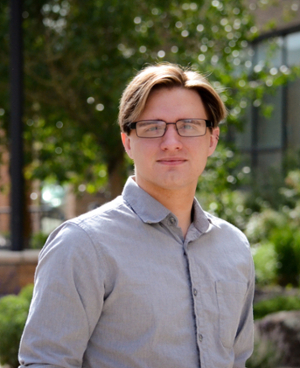Grant Copeland Joins School of Energy Resources to Advance Rare Earth Element and Critical Mineral Research
Published July 14, 2022

Grant Copeland of Norfolk, Va. is the latest addition to the expanding research team at the School of Energy Resources (SER). With a geological background in analytical chemistry and method development, Copeland will be working with the Center for Economic Geology Research (CEGR) to advance projects dedicated to rare earth element (REE) and critical mineral (CM) extraction in Wyoming.
In his new position, Copeland will primarily be supporting the CORE-CM (Carbon Ore, Rare Earth and Critical Mineral) projects looking at potential sources of REE and CM in regional coal basins. Copeland will often be seen in the lab conducting the analysis of current core samples.
Prior to joining SER, Copeland worked for Engineered Salinity (ESal), a start-up company in Laramie looking at enhanced secondary oil recovery method, doing experimental and computational work.
He received his bachelor’s degree in geology from Auburn University in 2018 with a concentration in structural geology. His studies included a 3-month field course in the Scottish Highlands. Shifting his focus to geochemistry, he graduated from UW in 2021 with his masters in geology and geophysics in the Kaszuba Research group with John Kaszuba, the John and Jane Wold Centennial Chair in Energy and SER Professor of Geology & Geophysics, as well as under the tutelage of UW geology professor Janet Dewey.
In addition to completing an internship with Advanced Resources International (ARI) working directly on the Wyoming CarbonSAFE project, Copeland also participated in the Imperial Barrel Award (IBA), which is an annual prospective basin evaluation competition for geoscience graduate students from universities around the world. On the UW team of 5 students that competed in 2019, Copeland was tasked with the seismic interpretation of their data set and analysis of the basin’s subsurface history.
With prior experience conducting reservoir property modelling and simulation for carbon sequestration in the Powder River Basin (PRB), Copeland will also be working on the Plains CO2 Reduction Partnership (PCOR) project where he will be calculating subsurface storage estimates.
“I am definitely excited to be here,” Copeland says. “One thing that stuck out for me is that SER is the bridge between academia and industry. The opportunity to take new developments and implement them in an industry where it will be used is wonderful. It is very satisfying to know that our work will make a difference and be impactful.”
Copeland will work under the supervision of CEGR Program Manager, Erin Phillips, who leads both the CORE-CM project in the Powder River Basin, and the PCOR initiative.
“I am so happy Grant has joined our team,” says Phillips. “Grant brings important experience to our critical minerals and CCS projects and I’m very much looking forward to working with him.”

